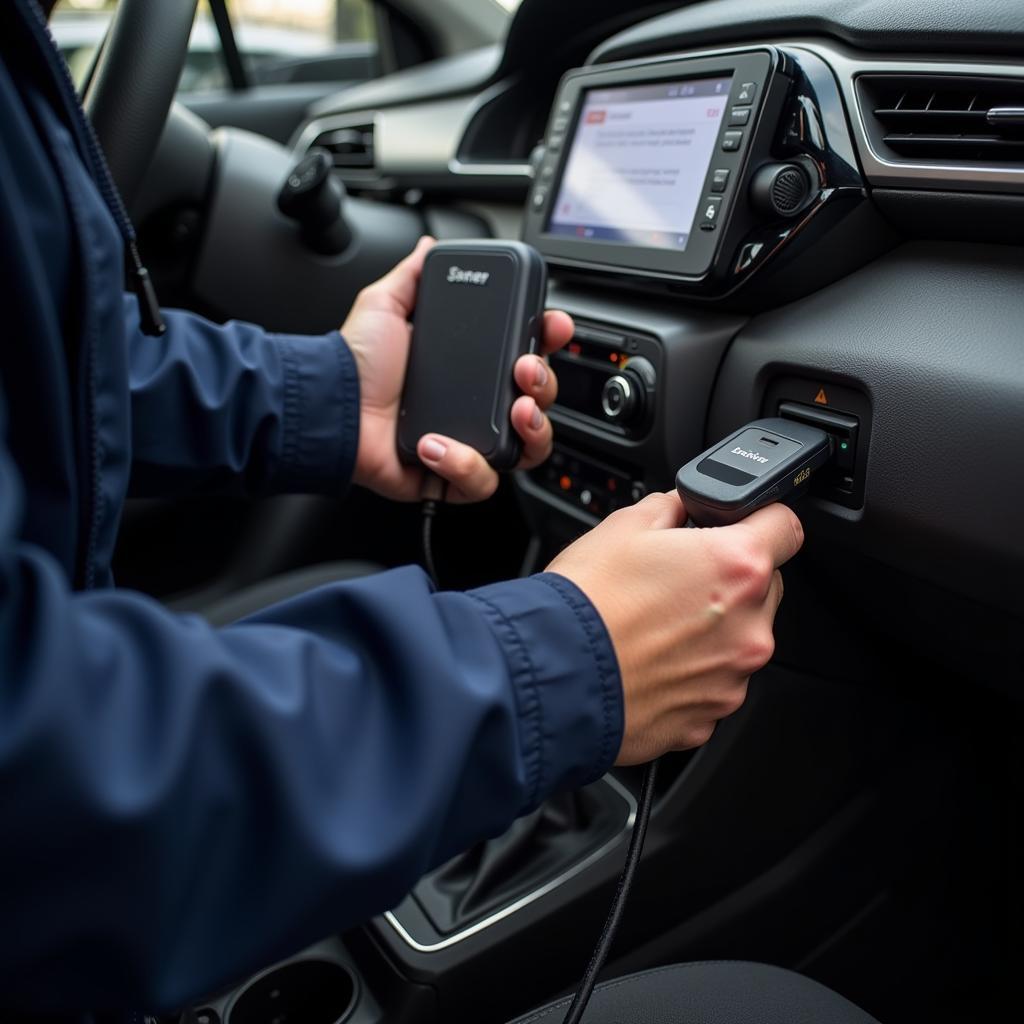A Car Diagnostic Test is a crucial step in identifying any issues with your vehicle. Whether you’re experiencing engine problems, warning lights on your dashboard, or just want peace of mind, understanding what a car diagnostic test entails can save you time, money, and potential headaches down the road.
What is a Car Diagnostic Test?
 Car Diagnostic Test Equipment
Car Diagnostic Test Equipment
At its core, a car diagnostic test is like giving your car a comprehensive health checkup. Using a specialized tool that connects to your car’s onboard computer system, mechanics can access a wealth of data about your vehicle’s performance. This data is then interpreted to pinpoint the root cause of any malfunctions.
Why is a Car Diagnostic Test Important?
Gone are the days of mechanics relying solely on their intuition and experience to diagnose car problems. Modern vehicles are equipped with sophisticated computer systems that monitor everything from engine performance to airbag deployment. When an issue arises, the system stores a corresponding Diagnostic Trouble Code (DTC) in its memory. A car diagnostic test reads these codes, providing valuable insights into:
- Engine Performance: Identifying issues related to fuel efficiency, ignition timing, and emissions.
- Transmission Problems: Diagnosing problems with gear shifting, slippage, and fluid levels.
- Brake System: Detecting faults in ABS, brake fluid levels, and other brake components.
- Exhaust System: Monitoring emissions and identifying problems with catalytic converters and oxygen sensors.
- Airbag System: Ensuring the proper functioning of airbags and seatbelt pretensioners.
What Happens During a Car Diagnostic Test?
- Connecting the Diagnostic Tool: The mechanic will connect a scan tool to your car’s OBD-II port, typically located under the dashboard on the driver’s side.
- Retrieving DTCs: The scan tool retrieves any stored diagnostic trouble codes from your car’s computer system.
- Interpreting the Codes: The mechanic interprets the codes, using their knowledge and experience to understand the nature and severity of the problem.
- Further Inspection: Depending on the codes retrieved, the mechanic may perform additional inspections or tests to confirm the diagnosis.
- Providing Recommendations: Once the problem is identified, the mechanic will provide you with a repair recommendation and cost estimate.
Types of Car Diagnostic Tests
While the basic principle remains the same, there are different types of car diagnostic tests:
- Basic Scan: This reads and displays the DTCs stored in your car’s computer system.
- Comprehensive Scan: This goes beyond basic code reading, analyzing live data streams from various sensors to provide a more in-depth understanding of your vehicle’s performance.
- Specialized Scans: These focus on specific systems, such as the engine, transmission, or ABS, providing detailed information about that particular system’s health.
How Much Does a Car Diagnostic Test Cost?
The cost of a car diagnostic test can vary depending on several factors, including:
- Location: Labor rates can differ based on geographical location.
- Type of Test: Comprehensive scans are typically more expensive than basic scans.
- Vehicle Make and Model: Some vehicles may require specialized equipment or software, affecting the overall cost.
It’s always advisable to inquire about the cost beforehand and compare prices from different mechanics or service centers. Some auto parts stores may also offer free diagnostic tests. To find a reliable option near you, search for “full diagnostic test on car near me” or “car battery diagnostic near me.”
 Mechanic Explaining Diagnostic Results
Mechanic Explaining Diagnostic Results
Common Car Diagnostic Test Myths Debunked
Myth: A car diagnostic test will automatically fix my car problems.
Fact: A diagnostic test is a diagnostic tool, not a repair solution. It identifies the problems, but further action is needed to fix them.
Myth: I can perform a car diagnostic test myself using a cheap OBD-II scanner.
Fact: While basic scanners can read DTCs, they often lack the comprehensive functionality and data interpretation capabilities of professional-grade tools.
Myth: All car problems will trigger a check engine light.
Fact: Some issues might not trigger a warning light immediately, highlighting the importance of regular diagnostic checks even when your car seems to be running fine.
Expert Insights
“Regular car diagnostic tests are essential for maintaining your vehicle’s health and longevity. Think of it as preventative healthcare for your car,” says John Smith, a certified master mechanic with over 20 years of experience. “Addressing minor issues early on can prevent them from escalating into major problems that require costly repairs.”
Conclusion
A car diagnostic test is an invaluable tool for car owners, providing valuable insights into your vehicle’s health and helping you stay ahead of potential problems. By understanding what a car diagnostic test entails, the benefits it offers, and the factors that influence its cost, you can make informed decisions about your car’s maintenance and avoid unexpected breakdowns. Remember, regular diagnostic checks, coupled with timely repairs, are key to keeping your car running smoothly for years to come.
FAQs
1. How often should I get a car diagnostic test?
It’s generally recommended to get a car diagnostic test at least once a year or every 12,000 miles, whichever comes first. However, if your car is experiencing any issues or you notice unusual warning lights, it’s best to get it checked immediately.
2. Can a car diagnostic test drain my car battery?
No, a car diagnostic test itself does not drain your battery. However, if your battery is already weak or faulty, the process of connecting and using the scan tool might put additional strain on it.
3. Can I drive my car with a check engine light on?
While it might be possible to drive your car with a check engine light on, it’s not recommended. The light indicates a potential problem that needs to be addressed. Ignoring it could lead to further damage and more costly repairs in the long run.
4. Will a car diagnostic test void my car’s warranty?
No, getting a car diagnostic test will not void your car’s warranty. In fact, regular maintenance and timely repairs, often guided by diagnostic tests, are crucial for maintaining your warranty coverage.
5. Can I trust the diagnostic results from an auto parts store?
While auto parts stores can provide basic diagnostic tests, their results might not be as comprehensive as those from a certified mechanic using professional-grade equipment. It’s always advisable to consult a qualified mechanic for a thorough diagnosis and repair recommendations.
6. What if I can’t afford the recommended repairs after a car diagnostic test?
If you’re facing financial constraints, discuss your options with the mechanic. They might be able to suggest alternative solutions, prioritize the most crucial repairs, or provide information about payment plans or financing options. You can also explore financing options for car diagnostic tools themselves through services like “car diagnostic tools on finance.”
7. Can a car diagnostic test detect problems with my car’s tires?
While a standard car diagnostic test primarily focuses on your vehicle’s electronic systems, it generally cannot detect problems with your tires. Tire pressure monitoring systems (TPMS) are separate systems that alert you to low tire pressure.
If you’re looking for information on the cost of car diagnostics at AutoZone, check out our dedicated article on “AutoZone car diagnostic cost.”
For those in the Sunbury-on-Thames area seeking a free diagnostic car test, we’ve got you covered! Explore our resources on “free diagnostic car test near Sunbury on Thames.”
Need further assistance? Our dedicated team of car diagnostic experts is available 24/7 to answer your questions and provide personalized guidance. Reach out to us via WhatsApp at +1(641)206-8880 or email us at [email protected].

Leave a Reply